Eden End is a play by J. B. Priestley, first produced by Irene Hentschel at the Duchess Theatre, London, on 13 September 1934.
Eden End is a play by J. B. Priestley, first produced by Irene Hentschel at the Duchess Theatre, London, on 13 September 1934.
In the last week of October 1912 the family of Dr Kirby, a widower in the North of England, is disturbed by the unexpected return of Stella, a "prodigal daughter" who left eight years before in order to pursue a career on the stage.
One Tuesday afternoon Wilfred and Lilian are reminded of their sister when the old nurse, Sarah, happens to bring out the frock Stella wore on her night of triumph at the Town Hall. The siblings argue over whether Stella was right to leave; as Wilfred is employed in Nigeria, Lilian complains that she feels obliged to stay at Eden End in order to keep her father company. They are listening to the gramophone when, to their amazement, Stella arrives home, her first return in eight years.
Stella is enraptured by the familiar sights, and excitedly questions Wilfred and Lilian about what has happened in her absence. But when alone with Sarah she breaks down; her plans have come to very little. Her emotions are further stirred when Dr Kirby tells her how much he admires his daughter for boldly seeking her fortune, in contrast to his own decision to stay in northern England for the sake of his wife. He confides to her his belief that he has not long to live.
Lilian notices the mark of a recently removed wedding ring on her left hand, and Stella admits to her that in Australia she married a fellow actor, Charles, from whom she is now separated. Not long afterwards the eligible bachelor, Geoffrey Farrant, arrives at the house and sees Stella. Their former attraction is revived, to the anger of Lilian.
Charles Appleby arrives at Eden End that Friday; he has been called there by Lilian, who is jealous of Stella's easy relationship with Geoffrey. Charles interrupts their tryst, and Geoffrey is stunned to realise that Stella has failed to disclose her marriage.
Stella confronts Lilian and Lilian tries to justify her actions, revealing her long-suppressed anger over Stella's "selfishness", which, she claims, led to their mother's premature death.
On Saturday night Charles and Wilfred go out drinking. Stella expresses annoyance that Charles should lead her brother astray; Lilian takes the opportunity to continue their argument from the day before, and later Stella is again upset when her father, unaware of her lack of professional success, declares his admiration for her pluck.
Realizing that she no longer fits in her former home, Stella announces her departure, on the pretext of having been cast in a new production. She and Charles leave on the Sunday train, and it seems that they will try to patch up their marriage.
The work premiered on Broadway at the Theatre Masque on 21 October 1935. The production starred Alexander Gauge (Wilfred Kirby), Edward Irwin (Dr Kirby), Edgar Norfolk (Charles Appleby), Wilfred Seagram (Geoffrey Farrant), Louise Smith (Lillian Kirby), Ruth Vivian (Sarah), and Estelle Winwood (Stella Kirby).
In 1974, the National Theatre's production at The Old Vic starred Joan Plowright as Stella Kirby, Michael Jayston as Charles Appleby and Geoffrey Palmer as Geoffrey Farrant. The production was adapted for BBC Radio 4 that same year, described as a "stereophonic radio version".
A Streetcar Named Desire is a play written by Tennessee Williams and first performed on Broadway on December 3, 1947. The play dramatizes the experiences of Blanche DuBois, a former Southern belle who, after encountering a series of personal losses, leaves her once-prosperous situation to move into a shabby apartment in New Orleans rented by her younger sister Stella and brother-in-law Stanley.
You Can't Take It with You is a comedic play in three acts by George S. Kaufman and Moss Hart. The original production of the play premiered at the Chestnut Street Opera House in Philadelphia, on November 30, 1936. The production then transferred to Broadway's Booth Theatre on December 14, 1936, where it played for 838 performances.

The Yeomen of the Guard; or, The Merryman and His Maid, is a Savoy Opera, with music by Arthur Sullivan and libretto by W. S. Gilbert. It premiered at the Savoy Theatre on 3 October 1888 and ran for 423 performances. This was the eleventh collaboration of fourteen between Gilbert and Sullivan.
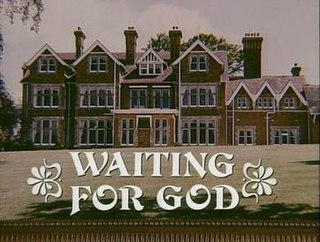
Waiting for God is a British sitcom that ran on BBC1 from 28 June 1990 to 27 October 1994 starring Graham Crowden as Tom and Stephanie Cole as Diana, two spirited residents of a retirement home who spend their time running rings around the home's oppressive management and their own families. It was written by Michael Aitkens.
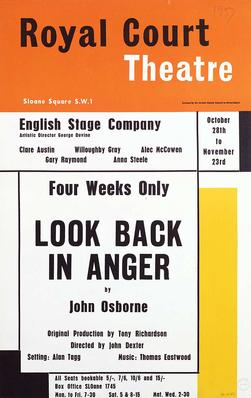
Look Back in Anger (1956) is a realist play written by John Osborne. It focuses on the life and marital struggles of an intelligent and educated but disaffected young man of working-class origin, Jimmy Porter, and his equally competent yet impassive upper-middle-class wife Alison. The supporting characters include Cliff Lewis, an amiable Welsh lodger who attempts to keep the peace; and Helena Charles, Alison's snobbish friend.
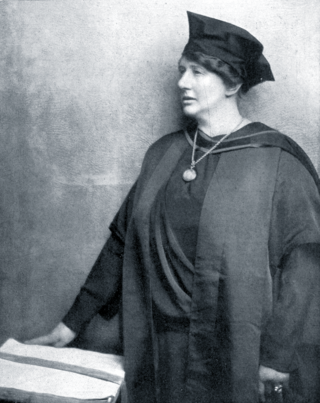
Lilian Mary Baylis was an English theatrical producer and manager. She managed the Old Vic and Sadler's Wells theatres in London and ran an opera company, which became the English National Opera (ENO); a theatre company, which evolved into the English National Theatre; and a ballet company, which eventually became The Royal Ballet.
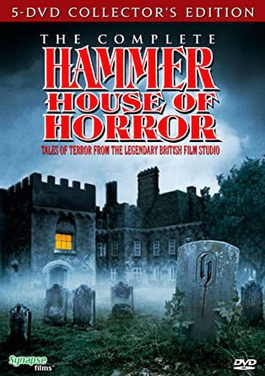
Hammer House of Horror is a British horror anthology television series produced in Britain in 1980. Created by Hammer Films in association with Cinema Arts International and ITC Entertainment, it consists of 13 hour-long episodes, originally broadcast on ITV.

A Streetcar Named Desire is a 1951 American Southern Gothic drama film adapted from Tennessee Williams's Pulitzer Prize-winning play of the same name. It is directed by Elia Kazan, and stars Vivien Leigh, Marlon Brando, Kim Hunter, and Karl Malden. The film tells the story of a Mississippi Southern belle, Blanche DuBois (Leigh), who, after encountering a series of personal losses, seeks refuge with her sister (Hunter) and brother-in-law (Brando) in a dilapidated New Orleans apartment building. The original Broadway production and cast was converted to film, albeit with several changes and sanitizations related to censorship.

Dorothy Renée Ascherson, known professionally as Renée Asherson, was an English actress. Much of her theatrical career was spent in Shakespearean plays, appearing at such venues as the Old Vic, the Liverpool Playhouse, and the Westminster Theatre. Her first stage appearance was on 17 October 1935, aged 20, and her first major film appearance was in The Way Ahead (1944). Her last film appearance was in The Others (2001).
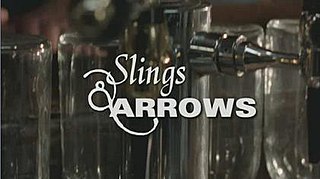
Slings & Arrows is a Canadian television series set at the fictional New Burbage Festival, a Shakespearean festival similar to the real-world Stratford Festival. It stars Paul Gross, Stephen Ouimette and Martha Burns. Rachel McAdams appeared in the first season.
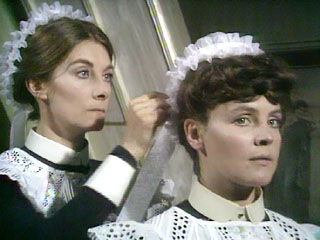
Sarah Moffat, also known as Sarah Delice and Clémence Dumas, is a fictional character in the ITV drama Upstairs, Downstairs and its spin-off Thomas & Sarah. She was portrayed by Pauline Collins.
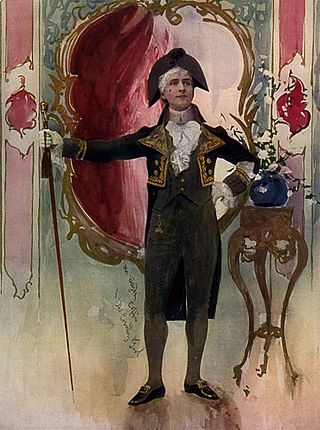
A Country Girl, or, Town and Country is a musical play in two acts by James T. Tanner, with lyrics by Adrian Ross, additional lyrics by Percy Greenbank, music by Lionel Monckton and additional songs by Paul Rubens.

Gigi is a musical with a book and lyrics by Alan Jay Lerner and music by Frederick Loewe. It is based on the 1944 novella Gigi by Colette and 1958 hit musical film of the same name. The story concerns Gigi, a free-spirited teenaged girl living in Paris at the turn of the 20th century. She is being groomed as a courtesan in her family's tradition. Before she is deemed ready for her social debut, she encounters the bon vivant bachelor Gaston Lachaille, whom she captivates as she is transformed into a charmingly poised young lady.
The Beginning is a 30-episode Mandarin Chinese episodic drama produced jointly by Singaporean broadcaster MediaCorp TV and Malaysian broadcaster Media Prima Berhad. It was the first joint production between the two companies, and is a remake of the 1997 Television Corporation of Singapore drama Rising Expectations.
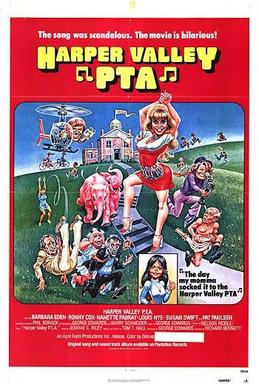
Harper Valley PTA is a 1978 American comedy film inspired by the popular 1968 country song "Harper Valley PTA" written by Tom T. Hall and performed by country singer Jeannie C. Riley. The film starred Barbara Eden, Nanette Fabray, Ronny Cox, Louis Nye and Susan Swift, directed by Richard Bennett and Ralph Senensky, and primarily released to drive-in theaters throughout the summer of 1978. The film has a cult following in fans of the original song. The film's promotional tagline is: "The song was scandalous. The movie is hilarious!"

This Other Eden is a 1959 Irish comedy drama film directed by Muriel Box and starring Audrey Dalton, Leslie Phillips and Niall MacGinnis.

Poldark is the original version of the BBC television series adaptation of the novels of the same title written by Winston Graham. The adaptation was first transmitted in the UK between 1975 and 1977. The production covered all seven novels that Graham had written up to this time.

Easy Virtue is a three-act play by Noël Coward, written in 1924 when he was 25 years old. The play depicts the conflict that arises within a conventional upper-middle-class household when the only son of the family marries a glamorous divorcée.

For Services Rendered is a play by Somerset Maugham. First performed in London in 1932, the play is about the effects of World War I on an English family.

Linda Verner was a British singer and actress of the Victorian era who appeared in operetta, pantomime, Victorian burlesque and other comic and musical works in London and on tour in Britain and abroad from the 1870s to the early 1890s.